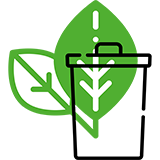Created on the initiative of the seven cantons of Western Switzerland, its objective is to boost the competitiveness and reputation of the region’s businesses. Backed by Switzerland’s State Secretariat for Economic Affairs (SECO), CleantechAlps strives to achieve three main missions:
Connecting
Multiplying networking activities to accelerate the integration of businesses into the ecosystem through various means including creating specific qualified relationship-building opportunities.
Supporting
Boosting the region’s positioning and profile and backing innovations on the new markets.
Promoting
Championing innovation in cleantech on a global level in support of the Sustainable Development Goals (SDGs) and encouraging the rollout of solutions to climate change challenges.
CleantechAlps is also...
- An economic development tool designed to consolidate the industrial fabric.
- A means of facilitating access to business leaders and decision-makers integral to the ecosystem.
- A common link at the interface of the industrial, economic, academic and institutional sectors.
- A network of more than 1,000 qualified players.
Plus...
- Actively involving sector players in new opportunities.
- Proactively structuring a programme of cleantech and sustainability events.
- Demonstrating the potential to provide a holistic analysis of the ecosystem.
- Having an understanding of different sectors, enabling it to adapt requirements to different contexts.
Priority industries
Cleantech has applications in a vast number of fields. CleantechAlps concentrates on the following sectors:

Hydrogen

Hydrogen
Taking in the entire value chain from production to consumption and including storage and distribution. We focus mainly on green hydrogen, in other words hydrogen produced using renewable energy sources.

Water

Water
Before it reaches our taps or is discharged into the environment, the water we use must be treated. The water treatment industry’s water efficiency initiatives are fast gaining ground in Western Switzerland.

Waste recovery

Waste recovery
Waste recovery consists of reusing, recycling and any other action designed to obtain reusable materials or energy from waste.

Smart grid

Smart grid
The smart grid is an ‘intelligent’ distribution network that uses different technologies to optimise the production and distribution of energy, in particular electricity (but it also applies to smart water). Among other things, it incorporates the Internet of Things (IoT) and artificial intelligence (AI).

Agritech/Agrifood

Agritech/Agrifood
The term agritech covers products, solutions and services that support a more sustainable development of the farming and food processing industries. It also covers the use of digital technologies and data processing in agriculture. This could include every aspect of agricultural production: land-use planning and soil, water and crop management, plant protection, herd management, animal health, mechanisation and many other areas. These technologies cover the entire value chain from farm to fork.

Small hydro

Small hydro
Small hydro is the name given to the development of hydroelectric power on a small scale (< 10 MW).

Circular
economy

Circular
economy
The circular economy is an economic system of production, trade and consumption designed to optimise the use of resources and reduce the impact of economic activity on the environment, from the design of a product through to the end of its life.

Hybrid technologies

Hybrid technologies
This refers to all of the new processes, new technologies (IoT, AI, etc.) and new materials that improve existing technologies, particularly in terms of their ecological footprint.

Photovoltaic solar

Photovoltaic solar
Photovoltaic solar energy is the production of electricity by converting some of the radiation emitted by the sun using a photovoltaic cell.

Energy efficiency

Energy efficiency
In Switzerland, the building sector alone consumes 45% of the country’s energy. This presents us with major challenges of how to improve the energy efficiency of our building stock. Energy efficiency also plays a crucial role in the energy transition in transport and industry.

Eco-mobility

Eco-mobility
Eco-mobility is the implementation of modes of transportation and transport concepts that are less polluting, more sustainable and generate fewer greenhouse gas emissions.
Sign up for our newsletter
Stay up to date with the latest cleantech and sustainability news, events and opportunities open to you.


